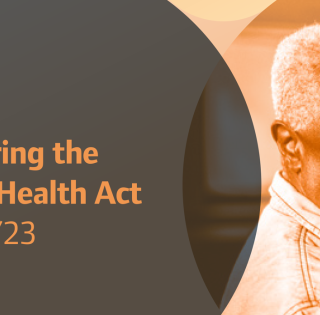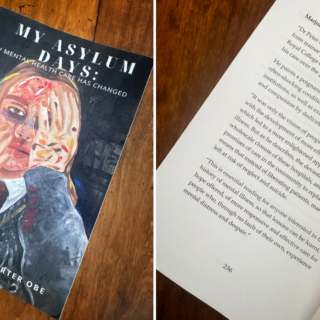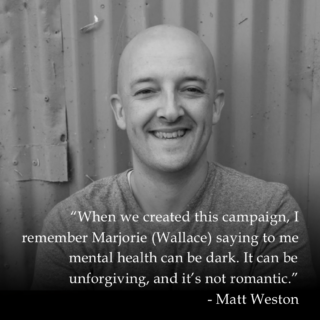Dancing Through Darkness: In conversation with Robin Windsor
“In my darkest times, somebody from SANE contacted me asking me about a tweet I had put on. It was then that I made contact with SANE and found somebody who would help me talk and everything just started getting better.”
In the enchanting world of dance, where movements become poetry and emotions find expression, one name stands out for its captivating talent and remarkable resilience: Robin Windsor. Renowned for his mesmerizing performances on the international dance floor and his participation on the hit show Strictly Come Dancing, Robin’s journey has been one of triumph over adversity, both on and off the stage.
We had the privilege of sitting down with Robin at SANE, where he shared his extraordinary story as a dancer and his own personal battles with mental health. Beyond his dazzling career, Robin’s true strength lies in his profound understanding of the healing power of dance, coupled with his unwavering dedication to supporting others. Robin has worked to empower individuals to harness their own inner strength and break free from the chains of mental health challenges through dance, motivational speaking, and various other endeavours, including becoming an official SANE Ambassador in 2018.

Hello Robin, lovely to have you visiting us here at SANE. Let’s start by getting to know a little bit about you for those who might not be familiar with your story. Could you share some memories or experiences from your childhood in Ipswich that had a significant impact on shaping who you are today? And What led you to pursue a career in dance?
Hi! My name is Robin Windsor. I’m mostly known for my appearances on BBC’s Strictly Come Dancing, but I actually started my dance career when I was just three years old. My parents enrolled me in the local dance school, back in Ipswich where I’m from, and I was always there. Really, from birth! Because my parents used to dance, and they caught me wiggling my hips in the mirror and asked if I’d like to have a dance lesson. I said yes and of course, the rest is history. I still wiggle in my hips now 40-odd years later.
Music makes me feel good and it makes everybody feel good, which is one of the reasons I’m still doing it now. I started off my dance career with competitions alongside my dance teacher, then with a dance partner, and eventually led to winning numerous local and national competitions. This success led the way for representing England at some prestigious World Championships held overseas.
Then, at 19, I found myself in sort of quite a big financial situation and I had to make a tough decision: Do I stop dancing, or do I get myself into more debt? So, I made the terrible decision to stop dancing.

As a result, I got myself into quite a lot of trouble in London. I was living on my own, trying to find a way to substitute the feeling of dancing with other things in life. I was the life and soul of the party as it were, but it was all getting a little bit too much at the moment. And then, just by chance, I ran into my old dance partner near Oxford St. Such a small chance considering she lived in Southampton! She said to me “Robin, you’re looking so thin! Is everything OK?” I said not really I’m missing dancing. To which she replied: “Well, I’m missing dancing as well. Why don’t you come and live with me and my family in Southampton and we’ll go and work on the cruise ships together?”
So, off I went to live in Southampton with her family, who took me in. They were amazing! We spent six months getting all the choreography together and sent off the VHS tapes to the cruise liners, because it was that long ago!
Corey, my dance partner, got a phone call from the choreographer of a dance show called Burn The Floor. She had already been part of that previously, and they said they’d love for her to go back, and that they had somebody else for her to dance with. But Corey said, “I can’t do this without Robin” and they were happy for her to bring me along. That was the change in my life that I needed.
I ended up off to America for what I thought was going to be just a three-month tour, but 10 years later, I was still with that same show, touring the world and finishing up with a nine-month run on Broadway. So, it was a very spectacular thing for me, it completely changed my life.
I owe being here at this point to that fortuitous meeting with Corey.
Q: Have you personally faced any challenges with mental health, and if so, how has that journey influenced your perspective on the importance of mental health awareness and support?

I didn’t really understand when I was 19 years old that I was suffering from depression at that time. And as I said, I was fuelling my life with as much as possible without drugs. Dancing is really what makes me happy and, without it in my life, I felt lost. Thankfully, I was given an opportunity to get back into it and had an incredible job traveling the world.
And after Broadway, I was like, “Well, what’s next for me as a dancer?” And of course, Strictly Come Dancing came along, and once again changed my life up to another level for the better.
After four amazing years on the show, I suffered a bit of an accident on my back having to have surgery and I ended up losing my job on Strictly. That was probably the worst thing that could have ever happened to me because it took away what I loved the most. I loved being on Strictly more than anybody who was there.
I got to dance and show 13 million people every single week what it was that I love to do. So, once that was taken away from me, I went into quite a steady decline.
Not really understanding what was going on I found that I was sad. And, I know we all have our dark days, but my dark days turned into dark weeks and I wouldn’t get out of bed. I didn’t really understand why I was feeling like that or how to get out of that state.
I also didn’t want to tell anybody how I was feeling. As a man at that time, being depressed was still a very taboo subject and I didn’t really want anybody to know how I was feeling. I was always seen as a happy person, always with a big smile on my face. Now I realise that those with the biggest smiles sometimes can hide the biggest pain.
The most frustrating part was feeling like I just could not tell anybody, and I let things get worse. I found myself in a very, very difficult situation where it was nearly the end for me.
It was actually around that time that I posted on Twitter and retweeted quite a few tweets from SANE and other mental health charities and things like that. Then, somebody from SANE contacted me asking me about it and asking me if I was OK.
I explained that I wasn’t doing too well and it was then where I got my contact with SANE. I then started to find somebody who could help me to talk to and the moment I started talking about it all, everything just started to get better.
I never believed that being able to talk about how you feel would be pretty much the Saviour.

Q: Now that you are a SANE Ambassador, what aspects of SANE’s work resonate with you the most, and why did you choose to align yourself with this particular mental health charity?
Knowing nothing about SANE, what resonated with me the most is how they contacted me and that they could see from a few tweets that I probably wasn’t doing so great. They put me in contact with somebody who then would call me once a week to check how I was doing. And then, the more I’ve learned about SANE, the more I wanted to help because every penny that’s raised goes to help those phone lines and it’s so important to be able to keep them open.
Also, coming here to see the work that they do. You just want to help others and you don’t want people to suffer in the same way that I did.
Q: What advice would you give to someone going through something similar to what you did?
Talk to a friend, anybody, just somebody. The scary part is being able to get the courage to talk to somebody but having them dismiss how you’re feeling. That was a big part of it for me. But once I finally spoke to somebody who completely listened I started to feel better. They didn’t really have to give me advice, they just listened and I could see that they wanted me to be better.
Q: As a professional dancer, how have you personally witnessed or experienced the impact of dance on mental health, and what role do you think dance can play in promoting positive well-being and emotional expression?
There’s something amazing about moving to music. I think I was always going to be a dancer. I just happened to be in a ballroom environment. Dancing clears your head for a period of time while you’re doing it, whether you’re having a good day or a bad day.
For me, when that red curtain went up, it didn’t matter what was going on in my life. I just got to forget everything else and just dance.
One of the things that I would love is for everybody in the country to get up and get dancing. To try it, and see if it helps them because it’s such an amazing tool and therapy for me that I think it would be of great help for so many other people.
I’ve gone into different companies and schools and places like that. People that have very stressful jobs, they take a few dancing steps and step away from all the stress. Just for an hour of dance. And we’ve noticed that when they go back to their job, they’re much more focused on what they’ve got to do. Dancing is an amazing tool!

I think a lot of the creative elements of singing, dancing, and acting, all really help people’s personal lives and work lives.
Q: You also do motivational speaking as well, right?
I do a lot of motivational talking. Basically, it’s going around telling my story, what happened to me, how I was able to fix it, and explaining to people how dance was such a major tool in my progress.
I really just want to be able to help others through my experience because there are so many people suffering. Still, maybe a year or so out of the pandemic, it has left people with a lot of mental health issues that weren’t there, to begin with. People were experiencing mental health issues for the first time and don’t know how to deal with it, especially men.
For men, specifically in the business world, talking about your feelings is not seen “very well” or as “very manly”. And I just really want to help people.
Q: Finally, as we are in the middle of Pride Month, could you share your thoughts on the significance of this event to you and what it means to you personally? Additionally, do you have any plans or initiatives in mind to celebrate and support the LGBTQ+ community during this month?
Pride Month is always very special. We’ve come an awful long way. There’s still an awful long way to go, and I know there are still teenagers across the country coming out who get disowned by their parents who have to leave home and have nowhere to go. These people need support and of course, their mental health is in turmoil because of all of that. There’s nothing worse than abandonment by your parent.
So as I said, we’ve come a long way, but there’s still a lot of help that’s needed for a lot of people. I think mental health and “coming out” go hand in hand with each other and people need all the support that they can get.





